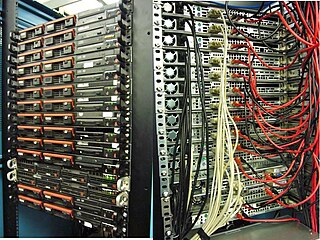
A bulletin board system (BBS), also called a computer bulletin board service (CBBS), was a computer server running software that allowed users to connect to the system using a terminal program. Once logged in, the user can perform functions such as uploading and downloading software and data, reading news and bulletins, and exchanging messages with other users through public message boards and sometimes via direct chatting. In the early 1980s, message networks such as FidoNet were developed to provide services such as NetMail, which is similar to internet-based email.

James Parry, commonly known by his nickname and username Kibo, is a Usenetter known for his sense of humor, various surrealist net pranks, an absurdly long signature, and a machine-assisted knack for "kibozing": joining any thread in which "kibo" was mentioned. His exploits have earned him a multitude of enthusiasts, who celebrate him as the head deity of the parody religion "Kibology", centered on the humor newsgroup alt.religion.kibology.
A Usenet newsgroup is a repository usually within the Usenet system, for messages posted from users in different locations using the Internet. They are discussion groups and are not devoted to publishing news. Newsgroups are technically distinct from, but functionally similar to, discussion forums on the World Wide Web. Newsreader software is used to read the content of newsgroups.

Factsheet Five was a periodical mostly consisting of short reviews of privately produced printed matter along with contact details of the editors and publishers.
The Great Renaming was a restructuring of Usenet newsgroups that took place in 1987. B News maintainer and UUNET founder Rick Adams is generally considered to be the initiator of the Renaming.
The Usenet newsgroup alt.religion.scientology started in 1991 to discuss the controversial beliefs of Scientology, as well as the activities of the Church of Scientology, which claims exclusive intellectual property rights thereto and is viewed by many as a dangerous cult. The newsgroup has become the focal point of an aggressive battle known as Scientology versus the Internet, which has taken place both online and in the courts.
Interpedia was the first-proposed online encyclopedia which would allow anyone to contribute by writing articles and submitting them to the central catalogue of all Interpedia pages.
An online encyclopedia, also called an Internet encyclopedia, is a digital encyclopedia accessible through the Internet. Examples include Encarta from 2000 to 2009, Wikipedia since 2001, the Encyclopædia Britannica since 2016, and Encyclopedia.com since 1998.

UUNET, founded in 1987, was one of the first and largest commercial Internet service providers and one of the early Tier 1 networks. It was based in Northern Virginia. Today, UUNET is an internal brand of Verizon Business.
alt.sex is a Usenet newsgroup – a discussion group within the Usenet network – relating to human sexual activity. It was popular in the 1990s. An October 1993 survey by Brian Reid reported an estimated worldwide readership for the alt.sex newsgroup of 3.3 million, that being 8% of the total Usenet readership, with 67% of all Usenet "nodes" carrying the group. At that time, alt.sex had an estimated traffic of 2,300 messages per month.
Eternal September or the September that never ended is Usenet slang for a period beginning around 1993 when Internet service providers began offering Usenet access to many new users. The flood of new users overwhelmed the existing culture for online forums and the ability to enforce existing norms. AOL followed with their Usenet gateway service in March 1994, leading to a constant stream of new users. Hence, from the early Usenet point of view, the influx of new users in September 1993 never ended.

Doctor Fun is a single-panel, gag webcomic by David Farley. It began in September 1993, making it one of the earliest webcomics, and ran until June 2006. Doctor Fun was part of United Media's website from 1995, but had parted ways by 2003. The comic was one of the longest-running webcomics before it concluded, having run for nearly thirteen years with over 2,600 strips. The webcomic has been compared to The Far Side.
alt.atheism is a Usenet newsgroup within the alt.* hierarchy that discusses atheism. The group was originally created on February 6, 1990 by a member of the alt.pagan newsgroup, to provide an alternative forum for the numerous discussions on atheism that were overwhelming the pagan group. A survey of usenet groups in 1994–1995 found that, among 70 groups discussing "consciousness, spirituality, and religion ", it was the group with the highest traffic volume. Nash (2002) writes that "atheist and freethought newsgroups" including alt.atheism have "done much to remove the sense of isolation felt by many with antireligious opinions".
ExecPC is an online service provider started in 1983 by owner Bob Mahoney as the Exec-PC BBS. It quickly grew to be one of the world's largest bulletin board systems in the 1980s and throughout the 1990s, competing with the likes of Compuserve and Prodigy.
A Usenet personality was a particular kind of Internet celebrity, being an individual who gained a certain level of notoriety from posting on Usenet, a global network of computer users with a vast array of topics for discussion. The platform is usually anonymous, although users can get celebrity status, usually by being deemed different from other posters in some way.

Usenet, USENET, or "in full", User's Network, is a worldwide distributed discussion system available on computers. It was developed from the general-purpose Unix-to-Unix Copy (UUCP) dial-up network architecture. Tom Truscott and Jim Ellis conceived the idea in 1979, and it was established in 1980. Users read and post messages to one or more topic categories, known as newsgroups. Usenet resembles a bulletin board system (BBS) in many respects and is the precursor to the Internet forums that have become widely used. Discussions are threaded, as with web forums and BBSes, though posts are stored on the server sequentially.
The Internet Hunt was a monthly online game and search training tool, conceived and conducted by Rick Gates, as Director of Library Automation UC Santa Barbara, which began 31 August 1992, before the World Wide Web.

Super Dimension Fortress is a non-profit public access UNIX shell provider on the Internet. It has been in continual operation since 1987 as a non-profit social club. The name is derived from the Japanese anime series Super Dimension Fortress Macross; the original SDF server was a Bulletin board system created by Ted Uhlemann for fellow Japanese anime fans. From its BBS roots, which have been well documented as part of the BBS: The Documentary project, SDF has grown into a feature-rich provider serving members around the world.

Michael Frederick Hauben was an American Internet theorist and author. He pioneered the study of the social impact of the Internet. Based on his interactive online research, in 1993 he coined the term and developed the concept of Netizen to describe an Internet user who actively contributes towards the development of the Net and acts as a citizen of the Net and of the world. Along with Ronda Hauben, he co-authored the 1997 book Netizens: On the History and Impact of Usenet and the Internet. Hauben's work is widely referenced in many scholarly articles and publications about the social impact of the Internet.







